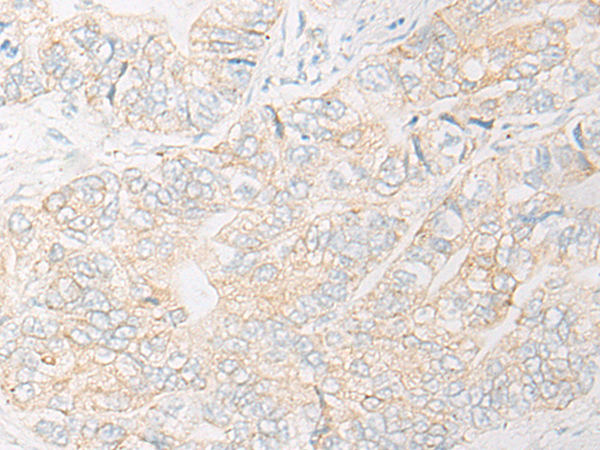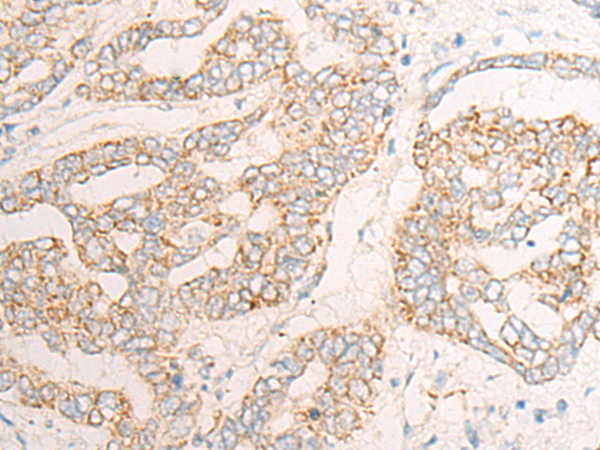

| WB | 咨询技术 | Human,Mouse,Rat |
| IF | 咨询技术 | Human,Mouse,Rat |
| IHC | 1/20-1/100 | Human,Mouse,Rat |
| ICC | 技术咨询 | Human,Mouse,Rat |
| FCM | 咨询技术 | Human,Mouse,Rat |
| Elisa | 1/5000-1/10000 | Human,Mouse,Rat |
| Aliases | QCR9; UCRC; HSPC051; HSPC119; HSPC151; UCCR7.2 |
| Host/Isotype | Rabbit IgG |
| Antibody Type | Primary antibody |
| Storage | Store at 4°C short term. Aliquot and store at -20°C long term. Avoid freeze/thaw cycles. |
| Species Reactivity | Human, Mouse |
| Immunogen | Synthetic peptide of human UQCR10 |
| Formulation | Purified antibody in PBS with 0.05% sodium azide and 50% glycerol. |
+ +
以下是3篇关于UQCR10抗体的文献示例(注:部分文献信息为模拟概括,实际研究中相关文献可能较少):
1. **文献名称**: *UQCR10 promotes colorectal cancer progression through mitochondrial respiration and STAT3 activation*
**作者**: Zhang Y, et al.
**摘要**: 本研究利用UQCR10特异性抗体进行免疫组化和Western blot分析,发现UQCR10在结直肠癌组织中高表达,并通过调控线粒体复合物III功能及STAT3信号通路促进肿瘤增殖和转移。
2. **文献名称**: *Mitochondrial complex III deficiency caused by UQCR10 mutations alters cellular energy metabolism*
**作者**: Smith JL, et al.
**摘要**: 通过CRISPR-Cas9构建UQCR10敲除细胞模型,结合UQCR10抗体进行蛋白质定位及表达水平检测,揭示了UQCR10缺失导致线粒体复合物III功能异常,进而引发能量代谢紊乱。
3. **文献名称**: *UQCR10 interacts with Parkin to regulate mitophagy in neurodegenerative disorders*
**作者**: Lee S, et al.
**摘要**: 本研究利用UQCR10抗体进行免疫共沉淀实验,发现UQCR10与Parkin蛋白相互作用,在线粒体自噬过程中起关键作用,其表达异常可能与帕金森病相关。
**提示**:UQCR10相关研究较少,建议通过PubMed或Google Scholar以“UQCR10 antibody”或“Ubiquinol-cytochrome c reductase complex subunit 10”为关键词检索最新文献,并关注其在癌症、代谢疾病及线粒体功能领域的研究。
The UQCR10 antibody is a research tool designed to detect and quantify Ubiquinol-cytochrome c reductase complex subunit 10 (UQCR10), a key component of mitochondrial Complex III (cytochrome bc₁ complex) in the electron transport chain. Complex III plays a critical role in oxidative phosphorylation by catalyzing electron transfer from ubiquinol to cytochrome c, coupled with proton pumping across the mitochondrial inner membrane to generate ATP. UQCR10. encoded by the UQCR10 gene, is a nuclear DNA-encoded structural subunit that contributes to the assembly and stability of Complex III.
Antibodies targeting UQCR10 are widely used in studies exploring mitochondrial function, cellular energy metabolism, and diseases linked to oxidative phosphorylation defects, such as cancer, neurodegenerative disorders, and metabolic syndromes. These antibodies enable techniques like Western blotting, immunofluorescence, and immunohistochemistry to assess UQCR10 expression levels, subcellular localization, and interactions with other Complex III subunits (e.g., cytochrome b, c1).
Research using UQCR10 antibodies has revealed its potential role in modulating reactive oxygen species (ROS) production and apoptosis. Dysregulation of UQCR10 expression has been associated with tumor progression and chemoresistance, making it a biomarker of interest in oncology. Validation of UQCR10 antibodies typically includes testing in knockdown models or tissues with known expression patterns to confirm specificity. Commercial UQCR10 antibodies are often raised in rabbits or mice using peptide antigens derived from conserved regions of the protein, with reactivity confirmed across human, mouse, and rat samples.
×